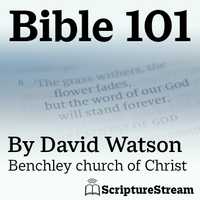Introduction
- Colossians 2:21 – “Do not handle, do not taste, do not touch!”
- Colossians 2:20-22 – Context.
Consider the original meaning …
… in that culture.
- Proverbs 31:31 – “let her works praise her in the gates”
- “Gates” was a common cultural idiom.
- Matthew 5:20 – “scribes and Pharisees”
- Matthew 23:1-3; Mark 7:3 – More information about scribes and Pharisees and why Jesus rebuked them.
- Matthew 18:17 – “as a Gentile and a tax collector”
- In that culture, Gentiles and tax collectors were hated and the Jews would not associate with them.
… to those people.
- Jeremiah 29:11 – “… plans for welfare”
- The context is the exile in Babylon.
- John 16:13 – “the Spirit … will guide you into all truth”
- I Corinthians 7:27 – “Do not seek a wife.”
… using those words.
-
“Samaritan”
-
“church”
- Acts 8:3 – The word church means “people.”
-
“fellowship”
-
“baptism”
Even if specifics have changed, find what is relevant to us.
-
I Corinthians 14
-
I Corinthians 14:5 – Our concern should be edification.
-
I Corinthians 14:40 – Worship should be orderly.
-
-
II Timothy 3:15 – Young people can study scripture. The Old Testament is valuable to study.
-
None of the Bible was written to us, but it was written for us!
Beware of wild interpretations that stray from the original meaning.
- Example: “Puff the Magic Dragon”
- Example: Jehovah’s Witnesses and Daniel 4:23-25
Bringing it all together
-
Test case: Matthew 24
-
Matthew 24:1-2 – The destruction of the temple was the context.
-
Matthew 24:34 – The events would happen within the lifetime of those present. The temple was destroyed in 70 A.D., which fits the prophecy by Jesus.
-
